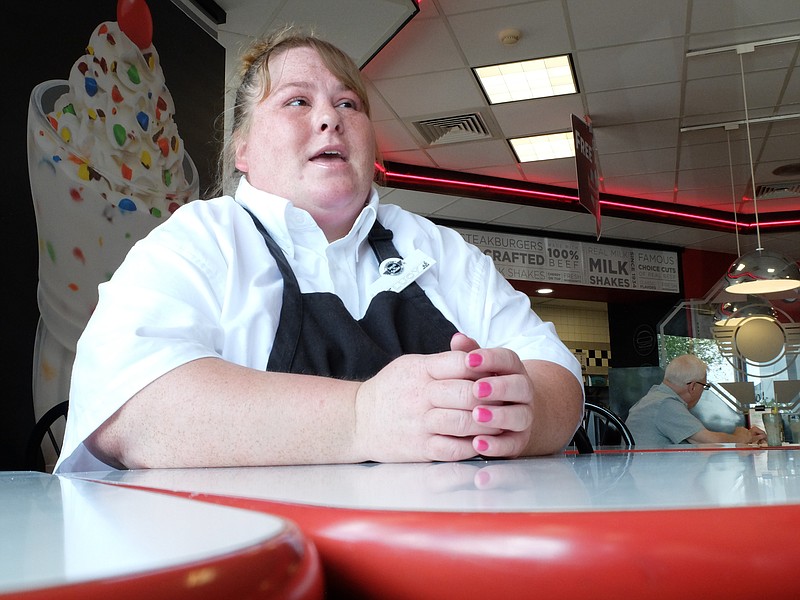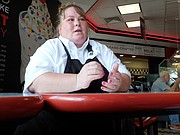Lucinda O'Boyle is one of millions of workers across Tennessee and the U.S. who are making more money this year than in 2015.
O'Boyle is a new kitchen food prep employee at Steak 'n Shake off Paul Huff Parkway in Cleveland, one of seven Steak 'n Shake locations operated by Chattanooga franchisee Debo's Diners.
And despite being in her current job only a few months now, O'Boyle's paycheck is already bigger than it was after more than a decade with her previous employer, a national fast-food restaurant in town.
"They didn't offer nothing" she said recently, of her previous employer. "I had been there 18 years and they never gave raises."
At Steak 'n Shake, O'Boyle started out making at least $1 more per hour than at her previous job.
"It's made quite a difference," she said. "I've got more on my paycheck. I don't have to struggle."
Nationally, labor trends currently reflect a shift toward higher wages, and workers such as O'Boyle everywhere are seeing more earnings go into their own pockets as good help becomes a premium in a tight labor market with a 4.7 percent unemployment rate nationally.
According to a recently-released state economic snapshot study by ranking U.S. Congressional Democrats, hourly income in 44 states and Washington, D.C., was up in May versus one year ago. And at the same time, according to the report, private-sector jobs increased and unemployment fell.
A recent Tennessee Department of Labor and Workforce Development survey, meanwhile, also concluded that in the Volunteer State specifically, the average wage of workers is up 30 cents an hour versus one year ago, as unemployment hovers around 4 percent statewide - the result of 39 straight months of slow but steady improvement.
On paper at least, the numbers indicate an improving overall economy, and despite some U.S. workers still suffering stagnant wages and underemployment, Americans are largely back to work.
But low unemployment rates like these carry side effects, including general wage inflation and a tight labor pool - meaning good help is hard to find, and workers are able to ask for better pay and bigger benefit packages. And they do.
This is especially true in industries that rely on staffing entry-level workers, due to competition among rival businesses and even across occupations.
Reggie Piercy, senior vice president of operations at Vision Hospitality, said the Chattanooga-based hotel chain feels the tightening of the labor pool and recently turned to outside help for the first time in company history.
Vision Hospitality is now using staffing agencies to help fill positions.
"At one time as a company, we didn't use any outside labor," Piercy said. "Now we're up to 25 percent in some markets."
Competition for workers in the housekeeping department has pushed wages up "to the tune of 10 percent," Piercy said.
Vision Hospitality also is facing new federal overtime rules that expand which full-time workers (those making $47,476 or more a year and who perform certain duties) are eligible for overtime pay.
Prior to the changes, some full-time workers making $23,660 or more a year could be made to work overtime without extra pay.
Piercy said Vision employs a lot of managers who make between $30,000 to $40,000 a year.
"We've got to figure out what we're going to start doing with that," he said. "Because they're going to start punching in."
Piercy said Vision will look at simply bumping some $40,000-a-year managers up to $47,000.
As a result, he said, the changes will ultimately impact the consumer. The best way to offset costs in the hotel business is introducing rate increases, because it requires no additional upfront expenses on the company's behalf.
For restaurants, meanwhile, competition for workers is also fierce, though Matt Richman, co-owner of Debo's Diners, said that isn't the only reason the company's Steak 'n Shake restaurants upped wages across the board this year.
Richman said his family, the owners of Debo's Diners, have always had a people-first approach to business, and area Steak 'n Shake stores have paid more than minimum wage and offered health benefits long before the Affordable Care Act was passed.
"We know if we treat people really well, we might not make as much as we could, but we'll get by because people will be loyal," he said.
Minimum wage at Debo's Diners Steak 'n Shake restaurants is now $8.25 an hour, though some new workers with experience start out making more than $9 an hour. Richman said every Debo's Diners Steak 'n Shake employee now makes at least $8.25 an hour.
The company also offers healthcare and a 401K plan with a 5 percent match and paid vacations for all workers after one year.
Richman said since offering better pay and benefits, Debo's Diners stores have experienced less turnover and fewer missed days by employees.
Richman said he hopes by going above and beyond what's required in terms of pay and benefits, Debo's Diners challenges other local employers to do the same as they compete for workers.
"Which is part of the free market," Richman said. "We're not a perfect company, and I won't claim we are. But we really do care."
For O'Boyle, the perks of being a Debo's Diners employee is enough to have her already talking about hanging around for years.
"If you only make $7 an hour, it's kind of difficult to have gas money, rent, electricity and that stuff," she said.
Now, she feels appreciated, and in the minimum wage world of food service, even sees a future without struggle.
"It makes me want to come to work and hustle doing things, because your owner appreciates you more than other owners," O'Boyle said.
Contact staff writer Alex Green at agreen@timesfreepress.com or 423-757-6480.

